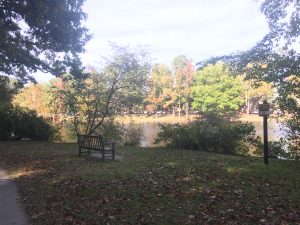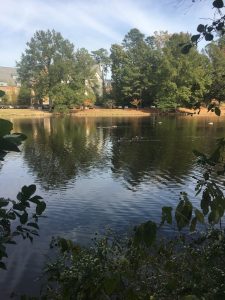Fishing for Answers
This is not my first visit to this place. I came here once I was old enough to hold a fishing pole. As I look out onto the murky lake, I see a two young siblings running from an aggressively honking flock of geese and cannot help but think that was me and my younger brother over a decade ago. I remember my dad sitting beside my grandfather sitting peacefully waiting for the fish to bite. I remember my mom telling me the story of my parents’ engagement at the gazebo many years before. I remember my dad being happy in this place and I have now followed in his footsteps.
But as I reminisce about my childhood, I realize how much this place has changed. There are no more fishermen in the dirty, algae-filled lake. The gazebo has become a place for smokers rather than a romantic spot for young couples. I see people walk by the lake, but they never take a second to appreciate the nature surrounding them. A can of Budweiser floats in the water in front of me and I sit here wondering where it might end up. Then I thought back to the informational trailer at the Dutch Gap cleanup. It takes 200 years for an aluminum can to dissolve in the ocean, compared to the two second decision it took for someone to put it there.
I agree with Jack’s feelings toward his reflection spot. Is this really the backyard wilderness Cronon had in mind? Nature should be a peaceful place, but I only hear the sounds of the cars zooming by, the bell tower chiming, and the people walking their dogs. Nature should be serene and calming like a fisherman would be during his day on the water, but there are fewer people each year who choose to fish in the contaminated lake. Have we lost our appreciation for the lake? Or have we become disconnected from nature?
A Different Kind of Wilderness
As I sit beside the sweet gum and gaze upon the rippling lake before me, I feel the gentle breeze on my skin. I hear the flapping of ducks’ wings on the water and the leaves rustling in the wind. The air is crisper than when I was last in this place and it feels like a true autumn day. The white oak above me is turning more orange than I remember. I see even more floating trash than before – a Busch Lite can, a plastic water bottle, and a Cookout milkshake cup. When I left my bench, I felt the acorns and fallen leaves crunching beneath my feet which I had not noticed before. I was surprised to see how much had changed since I had last been here.
Even though I realized several transformations in the scenery, much had remained the same. The geese still glided in packs across the water, the car alarms still blared, and the dog walkers still strolled past my place. After spending much time on this bench, I have been able to reflect on the “backyard” wilderness that Cronon encourages. However, I now feel as though there can be two kinds of nature: the one in our backyard and the one untouched by humans. I sit here in my reflection spot, I do not feel the kind of peace and serenity that I felt in the Old Growth Forest. Sustaining the nature in our own yards is essential to remaining connected with nature in some fashion, but the true wilderness is the most important in maintaining our appreciation for the land that will one day be extinct if we do not act.



Interesting journey through time from your childhood to today. I wonder if there is a change in perception caused by a change in you that is at least equal in magnitude to the change in the lake ecosystem. Great links to relevant supporting material. Give one last proofread before submitting; some typos in second sentence and tittle caption. Fun entry.